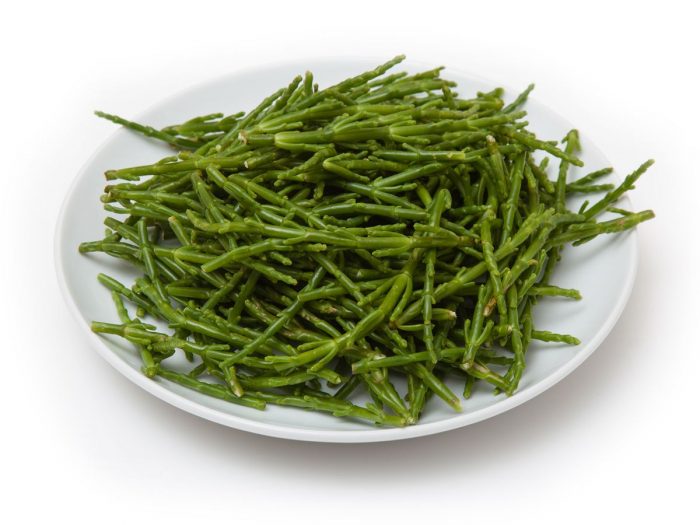Samphire is known to be nutritionally valuable and has a wide range of benefits, although it is a less commonly used herb. The benefits may include its ability to detoxify the body, aid in digestion, protect the immune system, weight loss, induce sleep, and boost circulation.
What is Samphire?
Samphire is a succulent that grows in rocky and marshy areas near salt-spraying water sources and is known for more than 500 years. In the realm of salty sea vegetables, there are only a few more famous than samphire, particularly the varieties that grow in the United Kingdom and across Eurasia. This small halophyte can grow in vast fields if left undisturbed and has picked up a number of nicknames along the way, including sea asparagus and sea pickle. [1]
Other variations on the name also exist in remote areas of the UK, but there is no mistaking samphire when you see it. It is a thick, grass-like plant that doesn’t grow longer than 3-4 inches, but can be readily picked and prepared in a number of ways. Historically, it has been used as a food source, similar to seaweed, but as more research is done on the nutritive value of this unusual sea vegetable, it has become even more popular.

Samphires are sea vegeables. Photo Credit: Shutterstock
Nutrition Facts of Samphire
The nutritive value of samphire is impressive, to say the least. Boasting almost no fat, this vegetable is packed with essential minerals, including magnesium, potassium, calcium, and sodium. That is in addition to a healthy amount of dietary fiber and vitamin A, B, and C. Furthermore, samphire contains unique compounds called fucoidans often found in sea vegetables, which can have anti-inflammatory and antioxidant effects. Together with its low-calorie (~100 calories per 100-gram serving), low-fat impact on your body, samphire can be a delicious and nutritious addition to your regular diet. [2]
Health Benefits of Samphire
Let’s discuss the health benefits of this vegetable and improve our health;
May Aid in Digestion
As a natural source of dietary fiber, samphire can do wonders for the body’s digestive system. Dietary fiber is able to bulk up the stool so that it can pass more easily through the digestive system without causing constipation or discomfort. Fiber can reduce inflammation in the gut and ensure that nutrient uptake is as efficient as possible. [3]
May Boost Immune System
Vitamin A and C are not only essential vitamins for processes throughout our body, but they may also have a significant effect on the immune system. Vitamin C stimulates the production of white blood cells, which are the first line of defense for the body. Furthermore, both these vitamins function as antioxidants and are capable of neutralizing free radicals and stopping them before they can cause chronic diseases and oxidative stress. [4]
May Improve Bone Health
Samphire is a very rich source of calcium, which is one of the benefits of adding this sea vegetable to your diet. With regular intake of calcium, you also may be optimizing your body’s intake of iron, which is known to be essential for good circulation in the body. More importantly, the calcium intake will keep your bones strong and durable as you age. Bone mineral density naturally drops as we grow older, so increased levels of calcium are needed to remain youthful and healthy. [5]
May Regulate Sleep
Magnesium doesn’t get much credit in the mineral world, but it can have measurable effects on the hormone balance, neurotransmitter production, and general quality of life for many people. Samphire may be quite possibly rich in magnesium and many people suffer from magnesium deficiency without even knowing. If you suffer from insomnia or regularly have restless nights, it could be a sign that your body’s natural rhythms are out of whack. Magnesium can be ideal for rebalancing your circadian rhythms and giving you a good night’s sleep. [6]
May Have Antioxidant Properties
Fucoidans found in sea vegetables have antioxidant effects that make them very important for human health. Adding samphire to your body may help protect against various diseases including from skin conditions, as oxidative stress from free radicals comes in many forms. Fucoidans can help to neutralize that threat and keep your body protected from any would-be pathogens or external attacks. [7]
May Aid in Weight Loss
The possibly low calorie and low-fat content of samphire is good news for anyone who has been struggling to keep their diet in check. Additionally, the dietary fiber in samphire works to optimize excretion and nutrient intake. It helps in making you feel full, by suppressing the ghrelin hormone in the body. When combined, this can lead to less snacking, more energy, and lower caloric intake to help you shed the pounds. [8]
May Reduces Inflammation
There are many inflammatory conditions that can affect the body, ranging from arthritis and gout to hemorrhoids and infected wounds. The potentially anti-inflammatory nature of samphire has made it a valuable herbal remedy, both when topically applied and consumed. It can help to ease pain and soothe swelling and inflammation, and even cause fevers to break. [9]
Word of Caution: While many of samphire’s benefits are clearly important, you should be aware that samphire is also very high in sodium. For people who already suffer from high blood pressure or are at high risk for cardiovascular diseases, samphire should be eaten with caution. That being said, when cooking with samphire, there is no need for more salt to be added, as the vegetable is more than enough to flavor the food.
